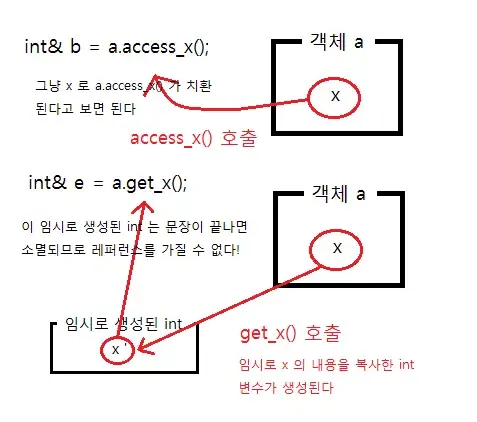초기화 리스트
C+++ 에는 클레스에 초기화 리스트 기능을 지원한다.
Marine 클래스 생성 예시
Marine::Marine()
{
hp = 50;
coord_x = coord_y = 0;
damage = 5;
is_dead = false;
}
//--------------------------------------초기화 리스트 사용------------
Marine::Marine() : hp(50), coord_x(0), coord_y(0), damage(5), is_dead(false) {}두가지 코드의 모두 동일한 일은 한다. 변수들의 초기화가 그것이다.
하지만 초기화 리스트는 변수를 생성과 동시에 초기화가 가능하다. 즉 int a = 1000; 처럼 하는 것이 초기화 리스트이다.
별로 중요하지 않다고 생각 할 수 있지만 const 상수는 생성즉시 초기화를 해야하는데 생성자를 호출해서 할경우에는 초기화 리스트를 사용해야 한다.
static 변수
// static 멤버 변수의 사용
#include <iostream>
using namespace std;
class Marine {
static int total_marine_num;
int hp; // 마린 체력
int coord_x, coord_y; // 마린 위치
bool is_dead;
const int default_damage; // 기본 공격력
public:
Marine();
void show_status();
static void show_total_marine();
~Marine() { total_marine_num--; } // 선언과 동시에 초기화
};
void Marine::show_total_marine() {
std::cout << "전체 마린 수 : " << total_marine_num << std::endl;
}
int Marine::total_marine_num = 0; // static 변수 초기화
Marine::Marine()
: hp(50), coord_x(0), coord_y(0), default_damage(5), is_dead(false) {
total_marine_num++;
}
void Marine::show_status()
{
cout << total_marine_num << '\n';
}
int main()
{
Marine marin1;
Marine::show_total_marine();
Marine marin2;
Marine marin3;
Marine::show_total_marine();
}
static 변수는 다른 인스턴스 변수처첨 class 안에서 선언과 동시에 초기화 할수 없다.
int Marine::total_marine_num = 0;
이와 같이 밖에서 초기화 해줘야한다 ( 원래 0 으로 초기화 되지면 명시적으로 적어주는 편이 좋다.)
호출은 위와 같이 스태틱 함수를 만들어서 호출해준다.
Marine::show_total_marine();
this
인스턴스 객체를 가르치는 포인터
#include<iostream>
using namespace std;
class A
{
int x;
public:
A(int c) : x(c) {}
int& access_x() { return x; }
int get_x() { return x; }
void show_x() { cout << this->x << endl; }
};
int main()
{
A a(5);
a.show_x();
int& c = a.access_x();
c = 4;
a.show_x();
// 아래는 오류
// int& e = a.get_x();
// e = 2;
// a.show_x();
}위의 예제는 this -> 이용해서 맴버 변수에 접극하는 것과 레퍼런스를 return 해서 밖에서 인스턴스 객체의 맴버 변수에 접근 하는 것을 보여 주고 있다.
오류 설명

값 을 return 하는것은 임시로 같은 type 을 가진 변수를 선언하고 거기에 값을 복사해 주는것이다.
물론 return 이 끝나면 임시 변수는 없어진다.
문제 1
아래와 같은 코드에서 복사 생성 은 몇 번 이나 표시될까요?
#include <iostream>
class A {
int x;
public:
A(int c) : x(c) {}
A(const A& a) {
x = a.x;
std::cout << "복사 생성" << std::endl;
}
};
class B {
A a;
public:
B(int c) : a(c) {}
B(const B& b) : a(b.a) {}
A get_A() {
A temp(a);
return temp;
}
};
int main() {
B b(10);
std::cout << "---------" << std::endl;
A a1 = b.get_A();
}
답
1. A temp(a) 에서
2. return temp 에서 temporary materialization 이 일어나면서. Named Return Value Optimization으로 생략 가능
3. A a1 = b.get_A() 에서 (2)의 temporary instance가 쓰이면서. c++11에서는 non-mandatory elision 으로 생략 가능, c++17에서는 mandatory elision 으로 무조건 생략해야함
씹어먹는 C++ - <4 - 4. 스타크래프트를 만들자 ② (const, static)>
modoocode.com
댓글